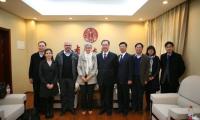Human Rights Education in China

Purpose
Human Rights Education (HRE) in China has expanded rapidly since 2001 and increasingly more universities have now established human rights centres, offering undergraduate and graduate level courses in human rights. Following the National Human Rights Action plan 2009-2010 and 2012-2015, eight National Human Rights Education and Training Bases have been established all over China. While HRE is fairly well established at university level and for law enforcement personnel like prosecutors, judges and police officers, for other relevant professional groups, in public schools and for the general public, HRE is limited.
Therefore, the level of human rights knowledge among the general public, and especially among vulnerable groups, is limited. Resources should therefore be put towards building the capacity of teachers below university level to teach human rights in their classroom. Primary and Secondary Schools do not teach human rights as a separate topic today which means that children and their parents are not adequately informed about human rights. Furthermore, public school teachers have limited knowledge about their human rights obligations, and therefore need capacity building to be able to meet these obligations. The same capacity challenge applies to civil servants.
The difference we made
The Center for the Study of Human Rights at Nankai University (NUC) situated in Tianjin is one of the eight National Human Rights Education and Training Bases in China. In 2014, the Danish Institute for Human Rights (DIHR) initiated a partnership project with NUC with the overall objective to strengthen the practice and knowledge of HRE in China through a three-pronged strategy of HRE: i) in primary and secondary schools, ii) human rights training of civil servants and supporting a platform for HRE experience, and iii) knowledge sharing for human rights teachers at university level. During the course of the project, the DIHR has supported NUC in developing HRE materials for primary and secondary school children with corresponding teaching guides, and subsequent training courses and pedagogical seminars for teachers.
This is the first time in China that this kind of material has been developed for use in primary and secondary schools as extra-curricular readings, laying the foundation for school children to be able to know and claim their rights. The next step is to introduce the material to schools in Tianjin and eventually be incorporated into the official curricular for schools across China.
Besides the pioneering work of developing HRE material for primary and secondary school children, this project has also developed human rights textbooks for civil servants and a corresponding human rights reader for instructors. These will be disseminated to national human rights research centres and administration institutes, and trainings on HRE methodology will be conducted for human rights instructors and human rights teachers. Furthermore, the project has sought to strengthen awareness on HRE methodology and the knowledge of human rights teachers from universities all over China through conducting an annual national network seminar for tertiary level human rights educators.
Partners
- The Center for the Study of Human Rights at Nankai University
Starts:2014
Ends: Present
